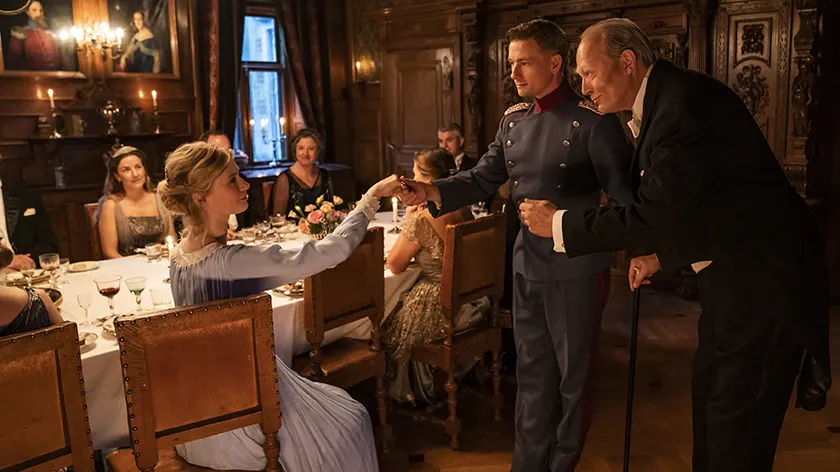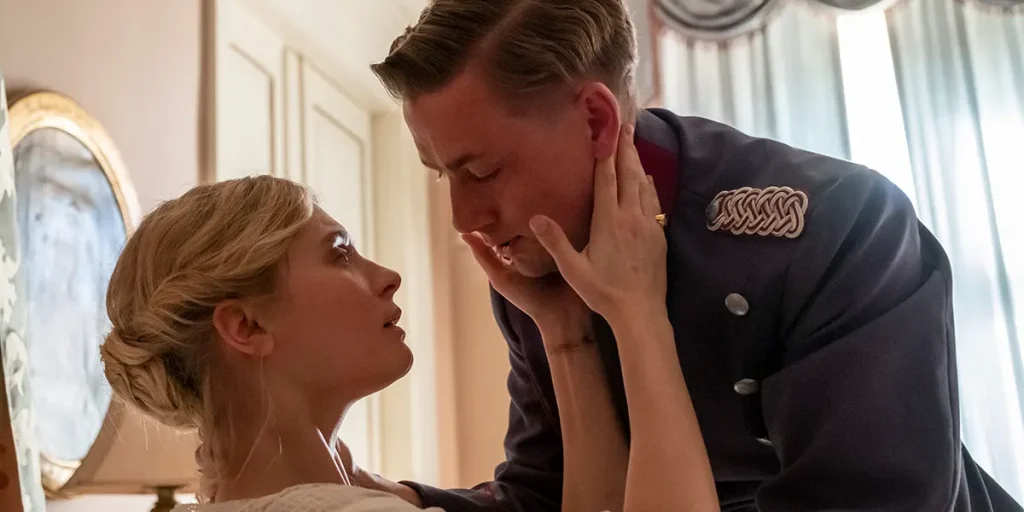Bille August’s The Kiss is a tragic and subtly complex tale of love, mental and physical health that benefits from strong performances.
Director: Bille August
Genre: War Drama, Romance
Run Time: 116′
U.S. Release: May 16, 2025
U.K. Release: TBA
Where to Watch: In select US theaters
Based on the promotional material, it would make sense for one to think that Bille August’s The Kiss (Kysset) is a traditional period romance, akin to films like Pride and Prejudice or The English Patient. Although there are similarities to be found with those productions, August’s latest ends up being a bit more subtle and complex, as it deals with a heavy subject matter, taking mental health into account in a time when it wasn’t really a thing.
Thus, even if The Kiss doesn’t end up feeling as romantic as some audiences would like, it still proves to be a rewarding and emotionally mature experience.
The movie takes place in the early years of World War I, in the Danish countryside, and centres on Anton (a believable Esben Esmed, looking very much like a Danish Taron Egerton), a young man from a poor family who is being sponsored by his Aunt Lily (Lane Lind) in order to train as a Second Lieutenant in the Danish Cavalry. One day, he and his troops find an old man and his chauffeur trying to get their car out of a muddy hole and end up helping them, which compels said old man, Baron Løvenskjold (Lars Mikkelsen, of Star Wars: Ahsoka) to invite the young soldier to dinner at his estate.
It turns out said dinner also includes a ball, and it’s at said party that Anton meets the Baron’s daughter, Edith (a magnetic Clara Rosager, of Morbius, of all films), who was involved in an accident years earlier, and is now paralysed from the waist down. After a rather uncomfortable first encounter, the young lieutenant decides to send the girl flowers, and is invited once again to her father’s house. Gradually, they become friends, and eventually, Edith falls in love with him. Unfortunately, Anton is less sure of his feelings; he does enjoy the girl’s company, but at the same time, is aware of the prejudices against “cripples” (as they are often called in early 20th-century Denmark), and the way his mates and especially his colonel might view him if he decides to be with her or even marry her.
The Kiss might initially sound like the perfect romantic story between a dashing (and Danish!) young soldier and a paralytic and sweet young woman. Thankfully, August manages to avoid many of the clichés one might find in a Young Adult novel or film with a similar premise. Most importantly, he treats Edith’s condition with respect and realism, never turning her into a walking stereotype or, even more damagingly, an offensive representation of a woman with a disability. He understands a relationship between someone like her and someone like Anton should be complex, especially more than a hundred years ago.

Thus, The Kiss ends up being all about their tumultuous relationship, and the way they take their sweet time to find a plausible way to convey their feelings for one another. In the case of Edith, we have a young woman who has tried to kill herself in the past, is prone to awful emotional outbursts, and has low self-esteem. She is always afraid of being considered as a lesser human being, and is afraid that Anton only wants to spend time with her because he pities her. She doesn’t want to play the victim, but unfortunately for her, she is also victimised by most of the people who surround her, except for her dad and her loving cousin, Anna (Rosalinde Mynster).
On the other hand, Anton is a very compassionate young man; in fact, he is the sort of person who actually doesn’t belong in the military, which is (tragically) conveyed during the film’s ending. He does pity Edith; not in a pessimistic or condescending way, but in a compassionate way. He learns to love her, even if she can be very unsure of herself and even of the way he feels about her, but is also afraid, unfortunately, of what others might think of him. This is not a consequence of his actions or even of his way of thinking, necessarily, but of the time and place they live in. Early 20th Century Denmark wasn’t the most inclusive of places, and even considering that Edith comes from privilege and has all the advantage (financial, social, racial) in the world, she is still viewed as a lesser kind of person and thus, undeserving of receiving love or building a family of her own.
It’s through Anton and Edith’s characterisations that we arrive at the film’s central conflict: that they want to be with each other, but have very different personalities and worldviews, especially when it comes to a potential marriage between them. Additionally, Anton takes his job seriously and is aware that his relationship with Edith is affecting it, but the latter wants him to be with her all the time. This demonstrates, rather realistically, that maybe they are not compatible; they might love each other, but a soldier with little time on his hands, who might even be required to go fight in a World War, might not be capable of taking care of a disabled young woman. It’s an impossible situation, which isn’t helped by either 1910s society or medicine.
Now, if The Kiss has one rather big problem, it’s that the romance between Anton and Edith doesn’t completely work; there’s not a lot of chemistry between Esmed and Rosager, and thus, most of the time, they feel more like friends than a couple. They don’t set the screen on fire, which means that, when we get to the inevitable but still tragic ending, it doesn’t precisely bring the waterworks. Despite those flaws, though, The Kiss still works as a complex representation of the way disabled people were viewed more than a century ago, and as an intriguing and ultimately mature narrative. The titular kiss might arrive a bit too late, but that doesn’t mean everything surrounding it isn’t worth experiencing.
The Kiss (Kysset): Movie Plot & Recap
Synopsis:
It’s the beginning of the First World War, and a Danish cavalry officer befriends the paralytic daughter of a wealthy Baron as he tries to balance his professional ambitions with his personal life.
Pros:
- Very strong performances.
- Visually potent.
- Surprisingly unpredictable.
- Treats its characters with respect.
Cons:
- The romantic aspect of the story is not completely believable.
- Meanders for a bit.
The Kiss (Kysset) will be released in select US theatres on May 16, 2025.

